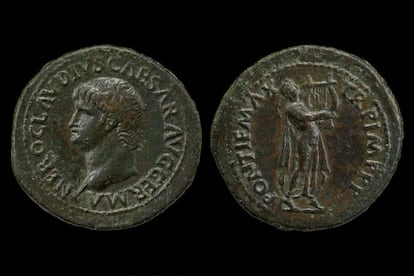Mary Beard’s ‘Emperor of Rome’ explores the exploits of its pitiless rulers
The Cambridge classicist uses a racy combination of facts and anecdotes to present 30 leaders of imperial Rome

Anyone who has seen a TV documentary on ancient Rome by Mary Beard cannot help but have a clear image of her disheveled appearance as they read her books. Nor will they have trouble sharing her contagious enthusiasm or surrendering to her wisdom. After all, this eccentric classics professor departs radically from what we traditionally expect from the standard Cambridge don. An award-winning historian who long ago understood the joy and duty of sharing research funded with public or private money, Beard needs no introduction. She has already penned tomes useful to both specialists and the wider public, such as Pompeii, SPQR and Twelve Caesars.
Her latest book, Emperor of Rome, could be seen as a sequel to Twelve Caesars. If in Twelve Caesars — a title used by the ancient Roman historian Gaius Suetonius — she examines images of power from imperial Rome, she now turns her Roman emperors into her subjects, from Julius Caesar, who almost became emperor on his own merit, to Alexander Severus, who inherited the role. She analyzes what they were like, what power they had and how they ruled Rome, a city that, from modest beginnings, succumbed under the weight of its own greatness, as Roman historian Titus Livius would tell it. Beard argues her case through facts and wild anecdotes from public and private life. She tells how Augustus ruled with cold passion and utilitarian calculation but also that he was moralistic father figure, shaved his legs and consumed pornography through paintings that decorated the walls of his house on the Palatine Hill.
Beard is a master of combining plain historical facts with lurid details to paint her portrait of the archetypal emperor, focusing on a tyrannical prince like Nero or the philosopher Marcus Aurelius Caesar, or exemplary military figures like Trajan or the transgender Elagabalus, who prostituted himself in the palace. She sources her material from rigorous historians like Tacitus and physicians like Galen, who diagnosed Elagabalus with angina as well as prescribing antidotes to the poisons that were rife at his banquets.
Beard talks to us about the power of the image of Nero on a coin playing the lyre. Or a description of a day in the Colosseum, a place from which Commodus shot arrows at wild animals and at his audience; or the stylus with which Julius Caesar tried to defend himself on the day of his assassination. Or we can immerse ourselves in the graffiti that records the emperor’s res gestae — things transacted — on a triumphal arch as well as an imperial fiscal control system on a Betic oil amphora container found in Rome’s Monte Testaccio landfill.
A picky reader will say that each new book by Beard brings with it a sense of déjà vu. But that said, they are extremely readable. We are hooked from page one, thanks in part to Beard’s very British sense of humor. Emperor of Rome is not your average dry history book narrating lives and exploits from birth to death, but rather a series of well-written essays in which the author does not focus on a specific Caesar but examines them alongside one another, according to theme. It doesn’t matter whether the topic is how they dressed, what they ate or where and with whom they slept; whether they were workaholics or lazy procrastinators, whether they were kind or cruel, the main thing that will strike the reader is that being emperor of Rome and carrying the weight of the empire on one’s shoulders was a dangerous profession and not an easy one to undertake. Of the nearly 30 subjects of Beard’s book, 12 were poisoned or otherwise murdered. And where there was a lack of intrigue and treachery, transgression and adultery filled the vacuum.
Beard’s skill lies in giving us a thorough examination of the rulers and those they ruled, from the public corridors of power to the private spaces of mundane, everyday life. She introduces us not only to the physical world but to the spirit of court culture — from the emperors’ diligence or ineptitude as a statesman, to impeccable moral conduct or insatiable cruelty and to sexual appetite. She not only reveals the anguish felt by the emperors, but also the fears of those they ruled and the hopes they placed in those who at times were seen as a simple mortal, at others a god among men.
Sign up for our weekly newsletter to get more English-language news coverage from EL PAÍS USA Edition
Tu suscripción se está usando en otro dispositivo
¿Quieres añadir otro usuario a tu suscripción?
Si continúas leyendo en este dispositivo, no se podrá leer en el otro.
FlechaTu suscripción se está usando en otro dispositivo y solo puedes acceder a EL PAÍS desde un dispositivo a la vez.
Si quieres compartir tu cuenta, cambia tu suscripción a la modalidad Premium, así podrás añadir otro usuario. Cada uno accederá con su propia cuenta de email, lo que os permitirá personalizar vuestra experiencia en EL PAÍS.
¿Tienes una suscripción de empresa? Accede aquí para contratar más cuentas.
En el caso de no saber quién está usando tu cuenta, te recomendamos cambiar tu contraseña aquí.
Si decides continuar compartiendo tu cuenta, este mensaje se mostrará en tu dispositivo y en el de la otra persona que está usando tu cuenta de forma indefinida, afectando a tu experiencia de lectura. Puedes consultar aquí los términos y condiciones de la suscripción digital.








































